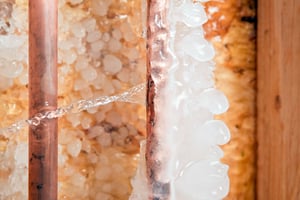 Extreme cold temperatures put your home or business at risk for frozen pipes. As water freezes, it expands and puts pressure on pipes. When there’s too much pressure on pipes, they burst. Most times, the areas you need to be most concerned about are unheated areas, like garages, closets, attics, and basements.
Extreme cold temperatures put your home or business at risk for frozen pipes. As water freezes, it expands and puts pressure on pipes. When there’s too much pressure on pipes, they burst. Most times, the areas you need to be most concerned about are unheated areas, like garages, closets, attics, and basements.
West Bend adjusters handle numerous burst pipe claims yearly, thanks to the extreme changes in weather. Often, these claims are on second homes or vacation properties. “These losses can be very large as the water can run for weeks,” says Scott Thomas, associate vice president of claims. In Scott’s experience, most of these situations occur when a furnace fails or the heat is turned down too far. These losses can be minimized by someone checking on the property during extreme weather and by utilizing remote temperature monitoring technology.
Even if heat is maintained at comfortable levels, pipes on outer walls can freeze during extreme weather. Luckily, there are steps you can take to help prevent this from happening in your home or business.
1. Insulation is Key.
Exposed pipes such as sprinkler lines or hose bibs, are most likely to freeze. Unheated spaces such as garages, basements, and crawlspaces are also susceptible to freezing. Insulating these pipes can prevent them from freezing. Go a step further and add insulation to your basement and attic to help maintain the temperature in cooler areas.
2. Monitor Your Heat.
Try to keep your heat at one setting day and night. I know, that heating your home or business can be very pricy but the added expense on your heating bill is much less than the cost of a broken pipe repair. If you plan to leave town for a few days, don’t set your heat to lower than 55 degrees.
3. Open Cabinets.
Open your cabinet doors and allow heat to circulate around the plumbing under your cabinets.
4. Allow Water to Trickle.
Keep your faucets on just enough so they drip; this keeps water moving and prevents it from freezing.
5. Prep for the Cold.
Make sure outdoor hoses are removed, water is shut off to the faucets, and lines are drained before winter.
If your pipes freeze, it is highly recommended that you call a professional to help thaw the pipes. Often pipes will burst during the thawing process so it is important to have a professional overseeing this in order to minimize damage.
Do you have any suggestions or information you’d like to share? I’d love to hear from you. Please share them in the box below.




